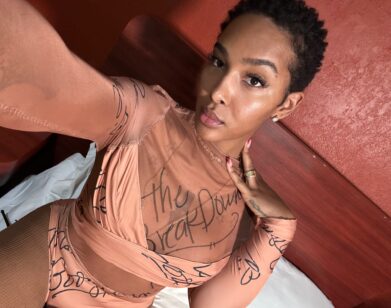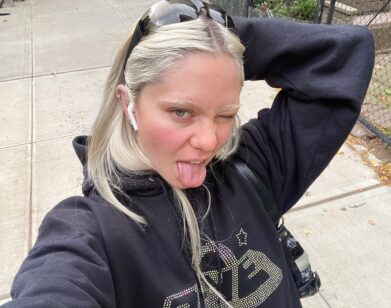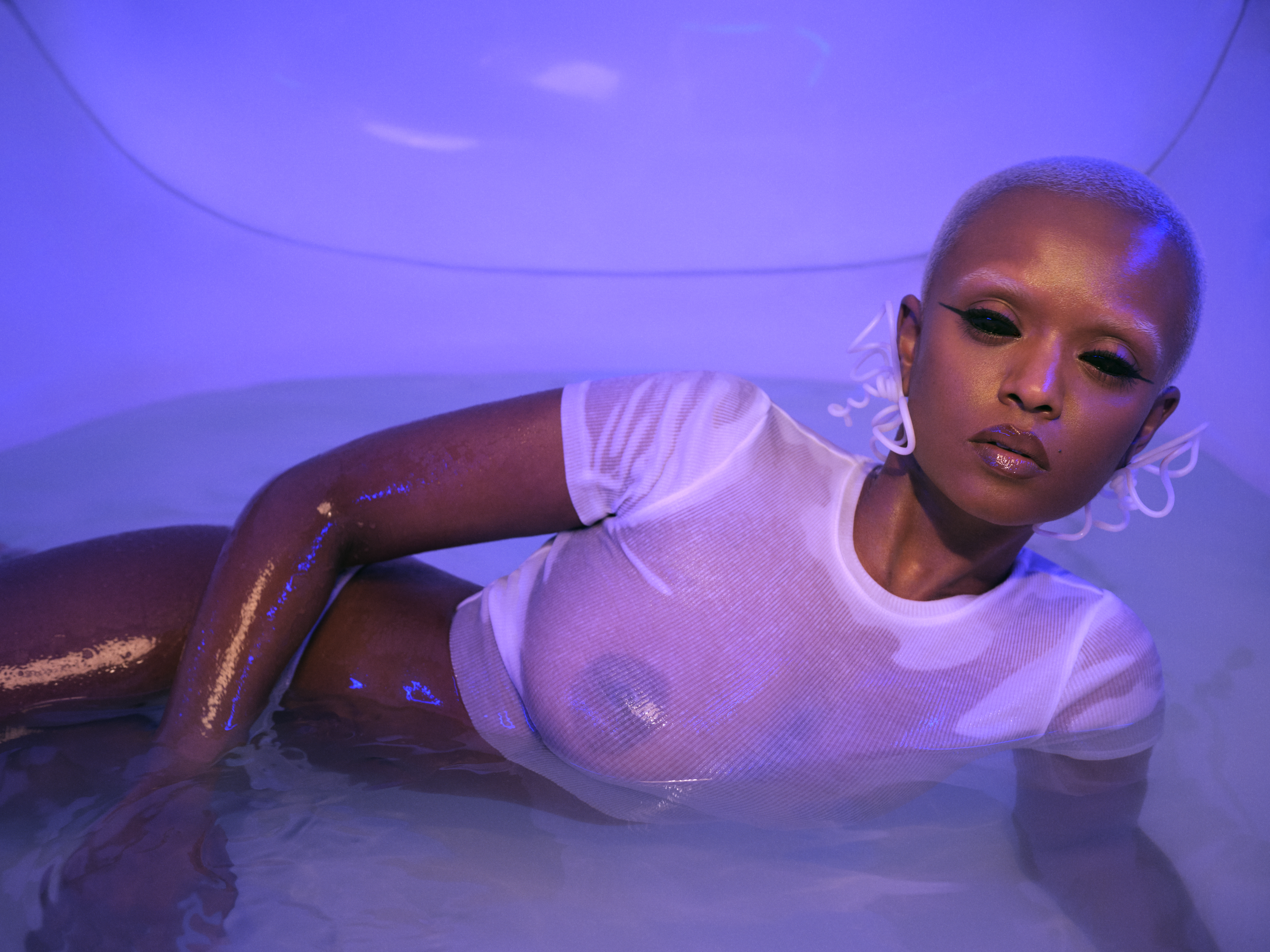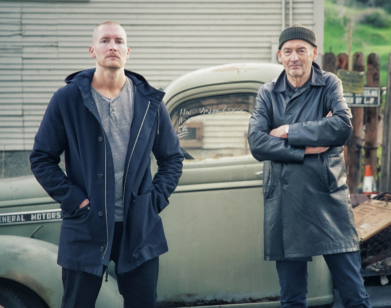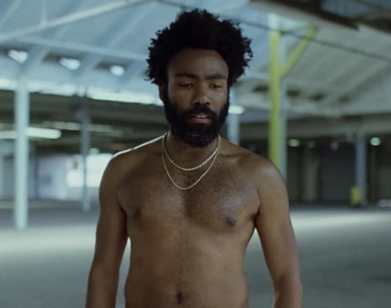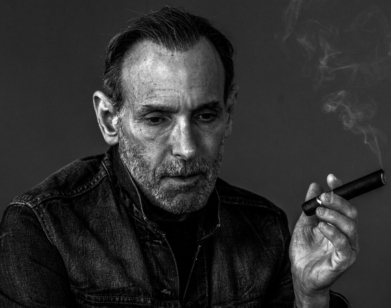Kelela on owning your power and championing self-care
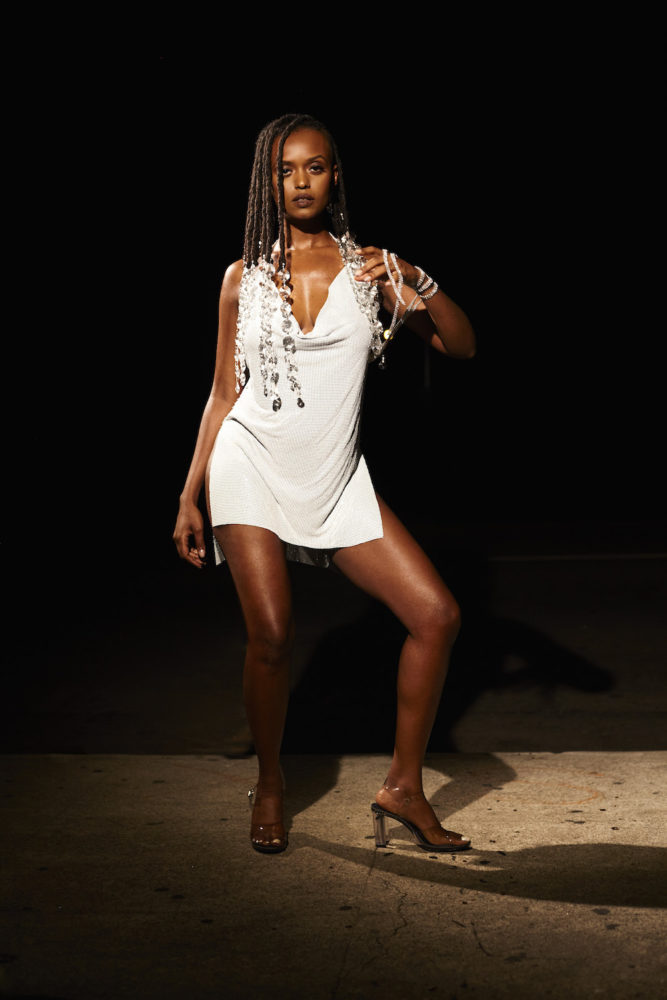
There is no rulebook for artistic success in 2017, nor is there a manual for musical innovation—but R&B liberator Kelela hasn’t needed any such tool, crafting her own boundary-pushing success since her first release, Cut 4 Me, four years ago. Her sound—which exists at the intersection of R&B, pop, and dance music—is the product of days spent singing jazz and rock music in her hometown of Washington, D.C., and nights spent downloading electronic music from the U.K. and elsewhere. She eventually went from a fan to a collaborator, enlisting producers like Bok Bok, Jam City, Arca, and Kingdom to help produce her records.
Take Me Apart, Kelela’s latest release, explores the relationships we have with others and ourselves, examining the power dynamics of love and heartbreak. The singer combines tender lyrical confessions with unpredictable soundscapes, some of which use field recordings drawn from her international travels. On the album’s closer, the sex playlist-worthy “Altadena,” she sings about inclusivity (“There’s a place for everyone”) in a reassuring, uplifting tone. Kelela has awed us with her confounding presence and grace, and she’s ready to offer advice from her rapid rise. You might want to take notes.
KNOW WHEN TO FORFEIT THE DAY
KELELA: Often I write to feel and better and to heal—to cope with things that I’m dealing with. I’m either writing to get out of a feeling or to get into the feeling, to feel it more. Usually it’s the perfect remedy, but if it isn’t, I focus on other parts of what I’m making that don’t involve writing. If neither are working, I simply forfeit the day.
For most of making Take Me Apart, I felt behind. On some days, it was really nice to liberate myself from the pressure of feeling that if I didn’t go to the studio, it doesn’t mean that I’m not committed or serious. Being a black woman in the music industry, I’m also avoiding the narrative of people thinking that I’m a diva. While making the first half of the album, I felt like I would be fulfilling a stereotype if I didn’t show up. It’s actually such a radical exercise for me to be like, “I’m not gonna do that today,” and instead choose to recalibrate.
AS AN ARTIST, YOU ARE ABUNDANT
KELELA: There is an abundance that artists embody within this industry, and everyone else is building a business around what you create. Over time, you start to understand that you are the source. It’s a truth that can keep you going.
In the very beginning of my career, I felt like I wouldn’t be able to do anything good again. I have a different relationship to the business now. If someone doesn’t get what I’m doing, it’s fine. I’m not afraid to lose the opportunity, because other ones always come that feel more wholesome and in line with my values.
The Hallucinogen EP is probably one of the most overt examples. I made the EP because I was told that I needed to release music or I’d be forgotten forever. Hallucinogen was pulled from Take Me Apart album tracks. For people who don’t actually generate the commodity itself, the art, it’s difficult for them to feel abundant and easy for them to make suggestions that will distract from your abundance.
INSPIRATION CAN BE FOUND IN TRANSIT
KELELA: For a lot of the songs on Take Me Apart, I tried to insert field recordings from transit—city sounds of cars and trains. I wanted to provide a soundtrack for real-life experience that sounds simultaneously wondrous and familiar and round-the-way, to make people feel magical and connected to what they are seeing, feeling, and hearing all the time. I feel a lot of my feelings looking out the window of a car or a plane or walking through the streets. I spent so many hours riding the subway in New York City and recording voice memos of the woman’s voice announcing the next stop. Only one or two moments made it to the album, but I had collected so many. I had some really cathartic experiences listening to the album while walking through Koreatown in Manhattan, just having a moment with the empty streets that was so cinematic.
SELF-CARE IS A REQUIREMENT
KELELA: The other night I did a show in L.A. where I sang in a plexiglass box on stage for my friend, Arca. At the end of the night, the room was filled with my friends. It was the cutest thing, but I was rehearsing for tour in the morning, and I had to go home and leave at the peak of the party. I often have to take care of myself and go to sleep when everyone else isn’t sleeping.
Another example is when I started working out again for tour, my entire body felt on fire. I was struggling to recoup, but when I got to rehearsal, it was so much easier for me to sing. I sang through the entire set for the tour without stopping for talking. I discovered that it’s easier to sing if I work out in the morning. Now I’m continuing to do this as a function of singing well and having some ease in my body and my throat.
Self-care is a requirement. I’ve come up with a lot of methods, like re-hydrating and dehydrating at the same time. I drink tequila and coconut water. I force myself to get massages and take care of myself. You have to think that you are the shit, and that if you work hard, you do get to have all of that shit.
POP MUSIC SHOULD BE RESPONSIBLE
KELELA: When it comes to melodies, production, and sound in pop music, people try to be formulaic and solely concerned with what’s resonant in a way that is so cheap and ugly. It actually just devolves culture, ultimately. I wanted to make pop music in a responsible way, in a way that helps people connect without losing the layers or sophistication of complex, intersectional feelings, like, “I love you, and this shit is done, and it’s a wrap,” but also, “Can we have dinner tonight?” My point is to show people how much we have in common in that regard, or how un-alone you are when it comes to complex feelings.
BEGIN COLLABORATIONS WITH CONVERSATION
KELELA: Before I collaborate, it’s important that I have a conversation about what I care about before we make anything, so that it’s very clear. On this record, I worked with a lot of white men; that’s just how it went. It was important to me to share what I experience on a regular basis and address that I’m being vulnerable in a world that doesn’t really give a shit about me. When I set the tone with that context, it makes people, especially men, operate differently. It’s less automatic, and they’re more present and deliberate.
With producers or visual collaborators specifically, they are letting me use their language by contributing expertise, insights, and vision so that I can express myself and my larger vision, as well. People respond to vulnerability with vulnerability. Vulnerability helps you achieve something that sounds sincere and feels sincere, so you can access higher levels of raw feeling with both the people you’re collaborating with and the listeners.
THE CHECKS ARE YOURS TO TAKE
KELELA: I come from the intersection of my black womanhood and a philosophy of doing shit yourself. My experience with money has always come from feeling like I didn’t need or deserve very much. Now I see money as a tool but also a reflection of what you think you should have. Now I feel very abundant. Coming into the game, it was very shocking to know that I could generate anything close to what I’m generating now. If you asked me five years ago, I would have been like, “No way. Not possible. I’ll never get that.”
I’ve learned through experience that I can just do whatever the fuck I want to do. It’s really based on how much I want to participate. I see it as a function of what I want rather than what I’m capable of. On one hand, there’s a reason to generate income because you want to have things, and you feel excited to have them; you should have them if you want them. The other part of that is creating the ability to build my own institutions, so that I can create a safe space for other people to feel comfortable and to feel good about themselves.
From the outside, it may seem like some artists are literally picking up every check, and that’s not always a bad thing. For a black woman, it can be one of the most radical things you could ever fucking do, to just take all of the money and then pour it into your own institution. That’s something I’ve seen illuminated more and more as I observe my idols and my peers.
My self-worth is not attached to money or to those checks. My self-worth is attached to what I do with them and how I’m contributing beyond myself.
KELELA’S DEBUT ALBUM, TAKE ME APART (WARP), IS AVAILABLE NOW.

